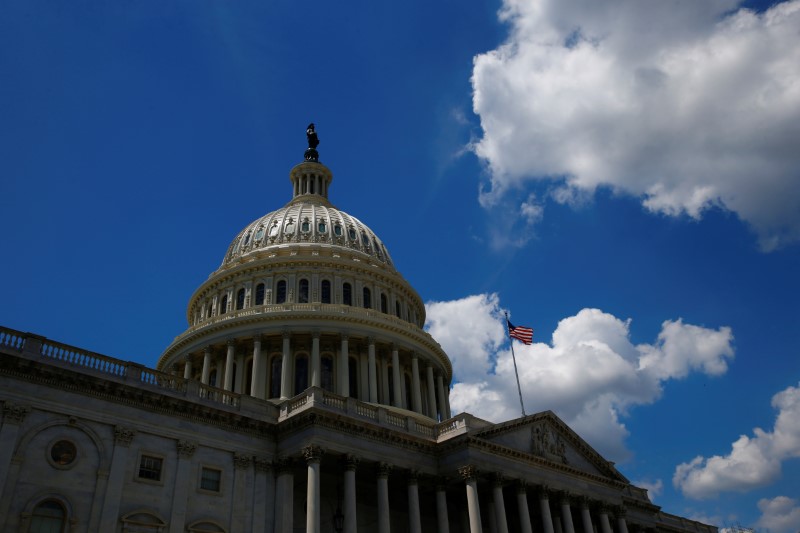(The opinions expressed here are those of the author, a columnist for Reuters.)
By James Saft
(Reuters) - If the United States does more than flirt with a government shutdown and technical default, old assumptions about the safe-haven status of Treasury debt and the dollar will face unprecedented threats.
Congress, which returns from recess on Tuesday, has until mid-September to pass a budget measure, one which the president is willing to sign. If not, absent a veto override, the government will be forced to shut down, probably in early October.
At the same time, the Treasury Department is running perilously close to the cap on borrowing. If the debt ceiling is not raised, the government will shut down and the United States will go into default by sometime in mid-October.
As there are deep divisions in the Republican Party, which controls Congress, and given Trump’s threat that “if we have to close the government down” he will build a Mexican border wall, which requires budget funding, there is a complex and unpredictable set of risks around the process.
Longtime Washington budget expert Stan Collender last week put the chances of a shutdown at 60 percent, and of a debt ceiling issue at a slightly lower likelihood. S&P Global Ratings sees the chances of a shutdown as “slim,” lowered in part by the political imperative of funding Hurricane Harvey relief efforts. But it has a stark vision of the impact if Washington stops writing checks and paying bills.
“Failure to raise the debt limit would likely be more catastrophic to the economy than the 2008 failure of Lehman Brothers and would erase many of the gains of the subsequent recovery,” Beth Ann Bovino, an economist at S&P, wrote on Wednesday.
A shutdown early in the fourth quarter would shave 0.2 percent from real GDP growth for each week it continues, S&P estimates. But a default would result in government spending cuts of about 4 percent of output, sending the country into a recession.
The relatively benign outcomes of 2011, when a budget debacle was narrowly averted, and 2013, when the government actually shut down, may give a too-rosy impression of both where the process is headed and what would happen if matters came to the worst.
The established view is that the United States retains its status as the ultimate safe haven, implying that riskier investments like equities and corporate debt would be hit by the economic impact of a shutdown but that Treasuries might actually rally, both in reaction to the prospect of lower growth and as investors seek the safest instrument even in a less-safe world.
THINGS HAVE CHANGED
That view may well prevail, and the job of working out the financial market impact of a shutdown, or even a short-term technical default, may simply be a matter of seeing whose economic ox gets gored and trading accordingly.
Yet there are some critical differences between the United State’s status and role in the world in 2017 and in 2011 or 2013. Not only is it less cohesive politically than in decades, but President Donald Trump’s erratic and belligerent behavior may combine to prompt a fundamental reassessment of exactly how risky U.S.-issued assets are.
“The dollar is under threat,” Didier Saint-Georges, of French asset manager Carmignac, writes in a note to investors.
“We are witnessing something unprecedented: there is a convergence of economic and political factors which is severely questioning the U.S. dollar’s status as the world’s dominant global currency. This could have massive implications for markets as we enter an age without the quantitative easing medicine.”
Not only has Trump frayed ties with allies and rivals alike, but the United State's relative economic and political condition compared with the rest of the world five or six years ago has changed.
China, which never faced democratic impediments to swift action, is both more outward-looking and aggressive, establishing and cementing economic and financial ties globally. Europe, which is now arguably at a more robust stage in its economic cycle than the United States was in 2011 in the thick of its sovereign debt crisis, and in 2013 was only beginning its long road to recovery.
The dollar has been notably weak, with the euro rising above $1.20 on Tuesday for the first time in more than two years. The trade-weighted U.S. Dollar Index (.DXY) has fallen 8 percent since Inauguration Day.
The idea that the dollar will remain the dominant global reserve currency, and with it Treasuries the best, most-liquid safe haven, looks a lot less valid than at any time in recent memories.

While a U.S. budget probably will be passed and the nation is unlikely to default, dollar assets still have far more at stake this time around.